Business
Whittlesey butcher makes appeal for customers on social media
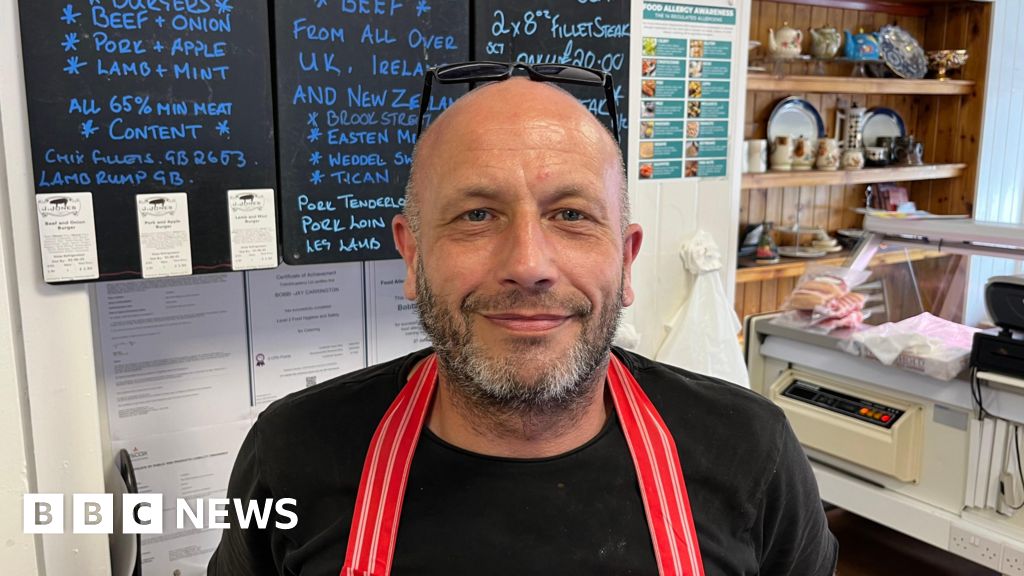
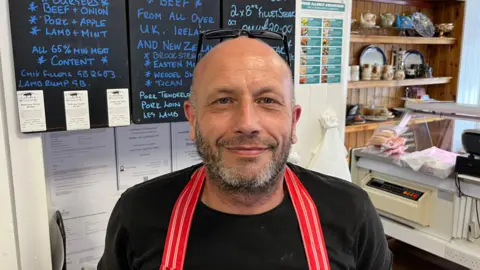 John Devine/BBC
John Devine/BBCA shop that has housed butchery businesses for more than 100 years could face the chop unless more people use it.
Jones Butchers has stood on Broad Street in Whittlesey, near Peterborough, since 1957 and before it, two other butchers dating back to the early 1900s have been there.
Mark Field, a butcher with 30 years’ experience, took over the business in June but has appealed for more customers on social media, putting his struggles down to the cost of living and the convenience of supermarkets.
Trade association National Craft Butchers (NCB) said beef prices were at an historic high, with the cost of meat generally rising 17%, which had made it tough for independent butchers.
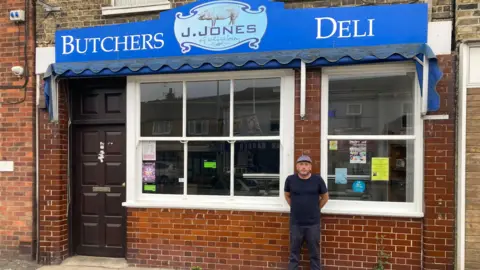 Mark Field
Mark FieldAfter always working for other people in the butchery industry, Mr Field, 47, thought he would try and go it alone and run his own shop after an opportunity arose.
“I am not regretting taking it on because I have a love for the job and I’ve always wanted to do this,” he said.
But despite a summer perfect for barbecues, Mr Field said he had already been forced to cut down on staffing hours and upped his own shift patterns, working 60 hours a week.
 GRAHAM JONES
GRAHAM JONES“Things have picked up a bit since I made the plea for more customers on Facebook last week, so I will keep my fingers crossed”, he said.
But he added: “The cost of meat has been rising across the board, and I think younger people can sometimes feel intimidated by coming in to a shop where they have to ask for something. They prefer picking up meat in packs from a supermarket.”
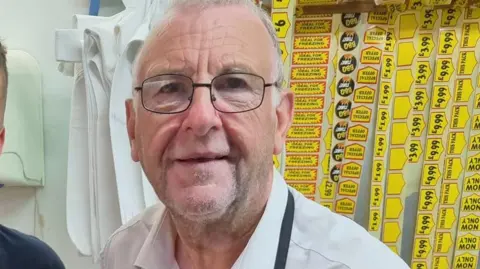 BENT AND CORNWELL
BENT AND CORNWELLAdrian Cornwell, who runs Bent and Cornwell in Ely, noticed that business had also been quieter this year.
“We can’t compete with supermarkets on prices, but what we can do is share our vast knowledge with our customers on how best to prepare various cuts of meat,” he said.
Mr Cornwell added that he had tried to replicate how the supermarkets displayed their meat, because “that’s what the shopper expects”.
He agreed with Mr Field that the younger generation seemed to forgo visiting butchers’ shops, preferring the convenience of the supermarket.
Beef prices have increased to historic highs of £7 per kg due to constrained supply and continued consumer demand, said NCB.
According to the British Retail Consortium, food prices rose by 4% in July from a year earlier.
Meat prices have also increased by 17% up to June this year.
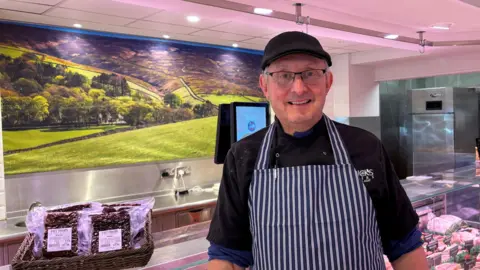 John Mettrick
John MettrickJohn Mettrick, legislation director at NCB and a fifth generation butcher, said it was “tough for all businesses on the High Street, not just butchers”.
He said his own shop had managed to entice younger customers by selling “kitchen-ready” meals.
“I do a thing called ‘fake-a-ways’, stir fries, Indian dishes, all prepared ready for the oven, it saves so much time,” he said.
Business
D-St blues! Sensex sheds 1.5K, biggest drop on a Budget day – The Times of India

At a time when global markets are witnessing high volatility due to geopolitical uncertainties, the hike in securities transaction tax (STT) on derivatives trades hit investor sentiment on Dalal Street on the Budget day. This in turn led to a sharp sell-off that pulled the sensex down by nearly 1,500 points—its biggest points loss on a Budget day—to close at 80,773 points. The sell-off also left investors poorer by Rs 9.4 lakh crore, the biggest Budget day loss in BSE’s market capitalisation.The day’s trading was marked by high volatility. The sensex rallied over 400 points as FM started her speech, fell about 1,100 points after the STT hike proposal was announced, partially recovered by mid-session to trade 600 points down on the day and then sold-off to close below the 81K mark for the first time in four months.On the NSE, Nifty too treaded a similar path to close 495 points (2%) lower at 24,825 points. Fund managers and market players feel the day’s sell-off was overdone, compounded by the absence of most institutional players since it was a Sunday. “The market’s reaction (to the hike in STT rates) was a bit overdone, although the decision itself was unexpected,” said Taher Badshah, President & Chief Investment Officer, Invesco Mutual Fund. “I think markets should settle down in 2-3 days.” Badshah said the Budget was in line with govt’s set path of the past few years, showing a conservative approach to setting targets.“The revenue and expenditure targets for FY27 are achievable. And since the rate of inflation is lower now, the nominal GDP growth rate of 10% may turn out to be on the higher side as inflation normalises during the year,” the top fund manager said. In Sunday’s market, of the 30 sensex stocks, 26 closed in the red. Among index constituents, Reliance Industries, SBI and ICICI Bank contributed the most to the day’s loss. Buying in software services majors Infosys and TCS cushioned the slide. In all, 2,444 stocks closed in the red compared to 1,699 that closed in the green, BSE data showed.STT hike aimed at curbing F&O speculation The decision to raise securities transaction tax (STT) for trading in equity derivatives means trading futures & options (F&O) will be more expensive from April 1. STT on futures trading rises from 0.02% to 0.05% now, and on options premium and exercise of options to 0.15% from 0.1% and 0.125% respectively. This could more than double statutory costs of trading F&O contracts.While the move is to curb excessive speculation by retail traders who mostly suffer losses, investors sold stocks of those companies that derive a large portion of their turnover from this segment. Stock price of Angel One crashed nearly 9%, BSE crashed 8.1%, Billionbrains Garage Ventures that runs the Groww trading platform, lost 5.1% and Nuvama Wealth Management lost 7.3%. STT hike follows a Sebi survey that showed that 91% of the retail investors lost money in the F&O market with average loss per investor surpassing Rs 1 lakh per year. Institutional and some high net worth players took home most of the profits from the segment.18% GST on brokerage for FPIs removedThe Budget proposed to do away with 18% GST charged on the brokerage that foreign portfolio investors pay in India. Among the host of changes to the GST laws that the finance minister proposed, one was abolishing clause (b) of sub-section (8) of section 13 of the Integrated Goods and Services Tax Act, 2017. This is being “omitted so as to provide that the place of supply for ‘intermediary services’ will be determined as per the default provision under section 13(2) of the IGST Act,” the Budget proposal said.
Business
Buying property from NRIs? Time to lose the TAN – The Times of India

Buying property from an NRI? Worried about obtaining TAN? Not anymore. To relax the compliance burden, the Budget has proposed that resident individuals and HUFs need not have a Tax Deduction and Collection Account Number (TAN) if they are purchasing a property from a non-resident Indian (NRI). The amendment will take effect from Oct 1, 2026.Under the proposed framework, resident individuals or HUFs can report the tax deducted at source (TDS) by quoting PAN, as is done when the transactions are between two residents. Presently, if a person buys an immovable property from a resident seller, the person is not required to obtain TAN to deduct tax at source. However, where the seller of the immovable property is a non-resident, the buyer is required to obtain TAN to deduct tax at source.Ameet Patel, partner at Manohar Chowdhry & Associates, said this used to be a detailed process. “At present, if a resident were to purchase an immovable property from an NRI, there is no separate relaxation regarding compliance with TDS responsibilities. As a result, in such cases, the buyer needs to obtain a TAN, register on the portal, and then deduct TDS u/s. 195, and pay to the govt. Under section 195, as with all other regular TDS sections, a quarterly e-TDS statement is required. A buyer would need professional help for all this.”Hinesh Doshi, CA, welcomed the move. “There used to be an unnecessary compliance burden due to this. While the process to obtain TAN is simple, people used to obtain TAN for just one transaction. So, this is a good riddance.”
Business
Harry Styles and Anthony Joshua among UK’s top tax payers

The former One Direction member-turned-solo artist appears on the Sunday Times list for the first time.
Source link
-

 Sports5 days ago
Sports5 days agoPSL 11: Local players’ category renewals unveiled ahead of auction
-

 Entertainment5 days ago
Entertainment5 days agoClaire Danes reveals how she reacted to pregnancy at 44
-

 Fashion1 week ago
Fashion1 week agoSpain’s apparel imports up 7.10% in Jan-Oct as sourcing realigns
-

 Business6 days ago
Business6 days agoBanking services disrupted as bank employees go on nationwide strike demanding five-day work week
-

 Tech1 week ago
Tech1 week agoICE Asks Companies About ‘Ad Tech and Big Data’ Tools It Could Use in Investigations
-

 Sports5 days ago
Sports5 days agoCollege football’s top 100 games of the 2025 season
-

 Politics1 week ago
Politics1 week agoFresh protests after man shot dead in Minneapolis operation
-

 Fashion1 week ago
Fashion1 week agoTurkiye cuts benchmark rate to 37%, flags confidence on inflation







